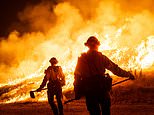Brits were today warned that a wave of pneumonia that covers the lungs in white spots is about to hit UK shores.
Speaking to MailOnline, infectious disease experts have urged health chiefs to stay 'vigilant' about new cases of the illness and isolate them — to prevent a large outbreak.
Also known as 'walking pneumonia', the bacterial infection is currently spiking across the globe, mostly affecting children.
In Japan nearly 6,000 cases have been reported so far this year — up more than 10-fold since last year.
Meanwhile in the US, infections among toddlers have jumped seven-fold since March, and doubled among older children.
The rapid spread is thought to be due to the fact initial symptoms are milder than other types of pneumonia — including a cough and slight breathlessness — meaning sufferers spread it while 'walking' around.
However, for those who are vulnerable including young children, it can trigger a host of complications including life-threatening brain swelling.
Experts say it's only a matter of time before a surge hits Britain.

Last year, the UK recorded its highest number of the infection — known medically as mycoplasma pneumonia — in five years.
This is three times the level detected in the previous epidemic.
The global surge is thought to be partly due to the hangover from Covid lockdowns — when pandemic measures interrupted the spread of routine bugs and weakened immune systems within populations.
Dr Mike Beeton, an expert in medical microbiology at Cardiff Metropolitan University, told MailOnline: 'We are likely to see an increase in cases in the UK over the winter months'.
He added: 'Mycoplasma pneumoniae was largely absent from the UK, among many other countries, after Covid restrictions were implemented, but came back in the autumn/winter of 2023.
'We should be vigilant for increased infections over the coming months.'
Meanwhile, Professor Paul Hunter, an infectious disease expert at the University of East Anglia, said virologists remain unsure 'what will happen this winter', due to lockdown-related changes in immunity levels.
He told MailOnline: 'Last year saw particularly high levels of children with mycoplasma attending UK emergency departments.


'Unlike most years, high levels of infections continued well into the summer.
'Normally I would have suggested that because of last winter I would not expect it to be so bad this winter.
'But it is more difficult to predict what will happen with infections following the pandemic.'
Latest UK Health Security Agency (UKHSA) data shows there were 2,592 confirmed mycoplasma pneumonia cases in England and Wales between October 2023 and March 2024 — seven times the level seen (364) in 2022/23.
Prior to this, infections last peaked in 2019/2020. But the number of cases logged in January 2024 was four times that of the same period in 2020.
UKHSA officials noted, however, this may be partly due to an increase in PCR testing since the Covid pandemic.
But experts are concerned cases may be going undetected and that the condition itself can lurk in the body for days before causing tell-tale symptoms, too.
It can take one to four weeks for someone to come down with symptoms after being exposed to mycoplasma pneumoniae bacteria, according to the Centers for Disease Control and Prevention (CDC).


The bacteria can cause respiratory tract infections that can damage the lining of the throat, windpipe, and lungs.
Symptoms tend to be mild compared to other types of pneumonia and can be treated with antibiotics.
But for some, mycoplasma pneumonia can lead to severe illness, hospitalisation and complications, such as deadly brain swelling called encephalitis.
Between 20 and 30 per cent of infections of mycoplasma pneumonia are also resistant to antibiotics, according to data released by the Japanese National Institute of Infectious Diseases (NIID).
MailOnline understands, however, health officials do not believe this to be the case in the UK.
Given its mild chest symptoms, many cases among adults 'are not formally diagnosed' and instead treated at home, Professor Hunter said.
Children, however, 'have had less time to build up partial immunity from previous infections so are likely more susceptible to infection in the first place', he told MailOnline.
'Pneumonia in children can also be more severe, possibly because of their smaller airways.'
Recent data released by the Japanese health authorities shows 1,195 cases were reported between October 21 and 27 alone.
Representatives from the Japanese Respiratory Society and other medical associations have called for the public to don masks to curb the outbreak.
People have also been urged to wash their hands thoroughly and make sure indoor spaces are ventilated — in an echo of measures instituted across the world during the pandemic.
It comes as Brits were told last week to brace themselves for a 'quadrupledemic' amid an upsurge in norovirus cases.
Rates of the vomiting bug are up over 40 per cent in just a fortnight figures show, piling pressure on the health service before the season even gets into full swing.
Covid, RSV and flu will also bite in the coming weeks, despite them currently circulating at low levels, health experts predict.
Richard Puleston, a consultant epidemiologist at UKHSA, told MailOnline: 'We see infections caused by Mycoplasma pneumoniae regularly in the UK and usually see cyclical increases of these every 3-4 years.
'The current infection levels are in line with what we expect. We are monitoring case numbers closely as part of our regular respiratory surveillance programme.
'Washing hands regularly, covering your nose and mouth when coughing or sneezing and avoiding contact with others when symptomatic can help reduce the transmission of respiratory infections.'












